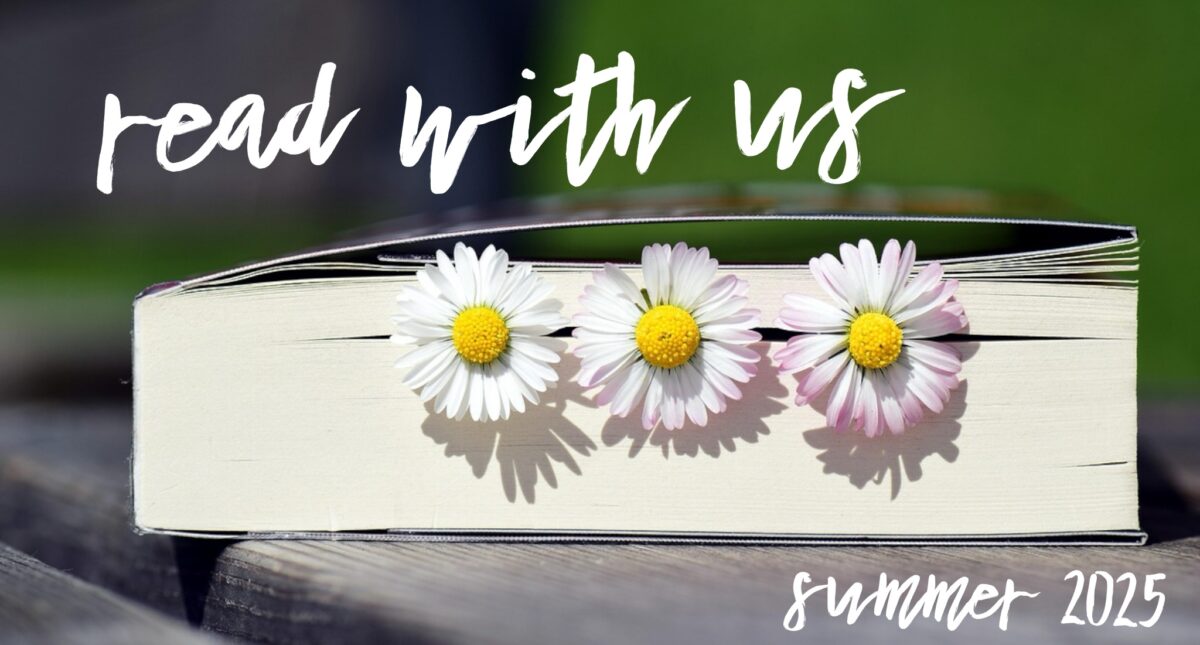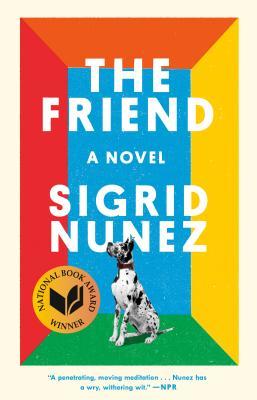
Welcome to . . . Read With Us Discussion Day
Bonny and Carole and I are posting discussion questions today for our latest RWU book . . . The Friend by Sigrid Nunez. Join the discussion by commenting on our blogs
 To get things rolling, I’m going to ask the same question I always ask . . . Did you read The Friend — or maybe watch the movie version? I’d love to hear your general impressions!
To get things rolling, I’m going to ask the same question I always ask . . . Did you read The Friend — or maybe watch the movie version? I’d love to hear your general impressions!
There are so many things to talk about with this compact novel, so we’ll be covering a lot of ground in our Zoom call tonight. For starters, though I’d like to throw out these questions about the style of the book . . .
The Friend doesn’t follow a traditional plot but moves through memories, anecdotes, and reflections. How does this fragmented style reflect the narrator’s mourning process? And how did it make you feel when you were reading? If you also watched the movie, do you think the filmmakers maintained the “feel” of the book?
And . . .
The Friend is often described as part novel, part essay, part memoir. Did this hybrid style work for you as a reader? How did you respond to the lack of a conventional plot? And . . . if you read the book AND watched the movie, which format did you prefer?
I can’t wait to hear your thoughts.
(Be sure to visit Bonny and Carole today for additional questions about The Friend.)
=========
Don’t forget: We’ll be discussing the book on Zoom tonight – 7:00 pm Eastern Time. There’s still time for you to join us! Just let me know of your interest either with a comment or by sending me an email (see sidebar, above) — and I’ll send you a Zoom invitation.
PS – If you are planning to join us on the Zoom, but haven’t received an invitation from me (I sent them Monday afternoon), please let me know so I can get the Zoom link to you today.





I read the book (again) and watched the movie. Am I glad I did? Yes. Did I like either of them? Not really.
I think that the book describes a journey through grief… from what must have felt like being on the sidelines a bit. The narrator is not a wife, nor an ex-wife, nor a child, nor a sibling but just a friend. I think that supposition poses an interesting idea… how different it is to mourn a friendship.
Stream of Consciousness writing is not my favorite form of writing, and my Books Read list supports that (I have such a small handful of this style of writing in my read stack… but of the few there are, this was my least favorite.)
For me, the movie was an entirely different beast… literally! Apollo was the star of that show… and truly, the best thing about the movie! But most especially because the director included the grief of Apollo in the plot. Because, yes… animals grieve.
And if I have to pick a format for The Friend… it would be the movie simply because of Apollo… he gave an award winning performance!
Thanks, Kat, for sharing your thoughts — and especially for reading a style of writing you really dislike.
Well-written stream-of-consciousness novels are one of my favorite styles of book to read. (Heavy emphasis on the well-written part. And I think Sigrid Nunez is a master at stream-of-consciousness writing.) I know it is unpopular with many readers, though. I think I love it because I usually relate well to the form. My own brain is very self-reflective and thoughtful, so it feels right at home with that style of writing. (I find poorly-written stream-of-consciousness writing quite tedious, though.) Anyway. I imagine most people who don’t enjoy the style of writing will also struggle to like the book. I appreciate your giving it a try, and I’m happy the movie tempered your experience somewhat.
I will argue, though, that “just a friend” is not an accurate relationship status in this particular book/instance. In fact, the book goes deeply into showing a very close and meaningful relationship between the narrator and her friend. I didn’t get the feeling she was “on the sidelines” at all.
I also would argue that the book does demonstrate the grief of the dog, although certainly not as poignantly as the film was able to do. The book is subtle; the film is definitely more about Apollo . . . but, to me, the movie still maintained the subtletly of the book when it comes to challenges of grief.
I’m looking forward to the discussion tonight.
When this book was first published I read it and like it. (4 stars)
But, as they say, you haven’t read a book until you’ve reread a book, which makes me think if I had read it a second time, I would love it more. Sorry I can’t join you tonight!
I think it’s the kind of book that does well with a re-read, and especially at a different phase of your life. I found it really resonated for me the first time I read it, and that it held up with a second read 6 years later! I wish you could join us tonight, too, Margene! (We miss you.)
I discovered that stream-of-consciousness writing is not my favorite, well-written or not. I didn’t really enjoy the book at all right after I finished it, but after several weeks to think about it, I do think it was a good portrayal of grief. The fragmentation in the book (normal during grieving) interfered with my ability to get a grasp on the whole thing. Because the narrator’s friend/occasional lover died by suicide, that left all kinds of unanswered questions, and I think that made it slightly more difficult for me. I do appreciate the consideration of grief from a friend’s point of view, especially when there are multiple wives left. But, I loved the movie! It was much more linear and straightforward, so maybe I’m just not good with subtlety. Even though I’m not a “dog person” I really hated to see how sad Apollo was in the movie, but was glad to see the bond he and Iris formed and what a good life she gave him. In almost all instances that I can think of, I like the book better than the movie, but that was not the case for me this time.
I know that I’m rather . . . freakish . . . in my embrace of the stream-of-consciousness writing style, and I would never have suggested this type of book for Read With Us EXCEPT that I had just seen the movie and thought it would fill in the blanks nicely, and make the book more palatable for most readers. I’m glad such was the case for you, Bonny. I think the movie was very true to the book’s message (and wise to leave out most all of the “writer-analysis” portions), and I found it very charming.
I’m looking forward to the discussion tonight.
I loved this book the first time I read it 6 years ago and loved it even more when I re-read it. I enjoyed the movie, but the book caused me to think and reflect on a deeper level. I like how the stream of consciousness is done in this book and how it led me to reflect on friendship-both human and animal, grief, and our expectations of those who are grieving. I look forward to the discussion!
Those are my thoughts/feelings about the book exactly, Debbie!
See you tonight!
I both read (with my ears) the book and watched the movie, and I much preferred the latter — but I think that’s largely because it made more sense to me. I don’t necessarily love stream-of-consciousness writing but don’t hate it, either; that said, audio really isn’t the format for it. I had trouble following it and often didn’t know if something was a quote or a thought or dialogue. I suppose that’s what happens when you go for the most easily accessed version from the library! I think the movie did embrace the spirit of the book but definitely focused much more on the dog and less on the narrator.
I think this would have been a very challenging audiobook selection. I will say that while I think you’d have enjoyed it more if you’d been able to read it with your eyes, I also think the lack of punctuation would have driven you crazy! But at least you could have re-read sections for context clues . . . There is a lot of depth in the book that was (rightfully so) cut from the movie. I hope the charm of the movie filled in some of the blanks for people who don’t like stream-of-consciousness narratives!